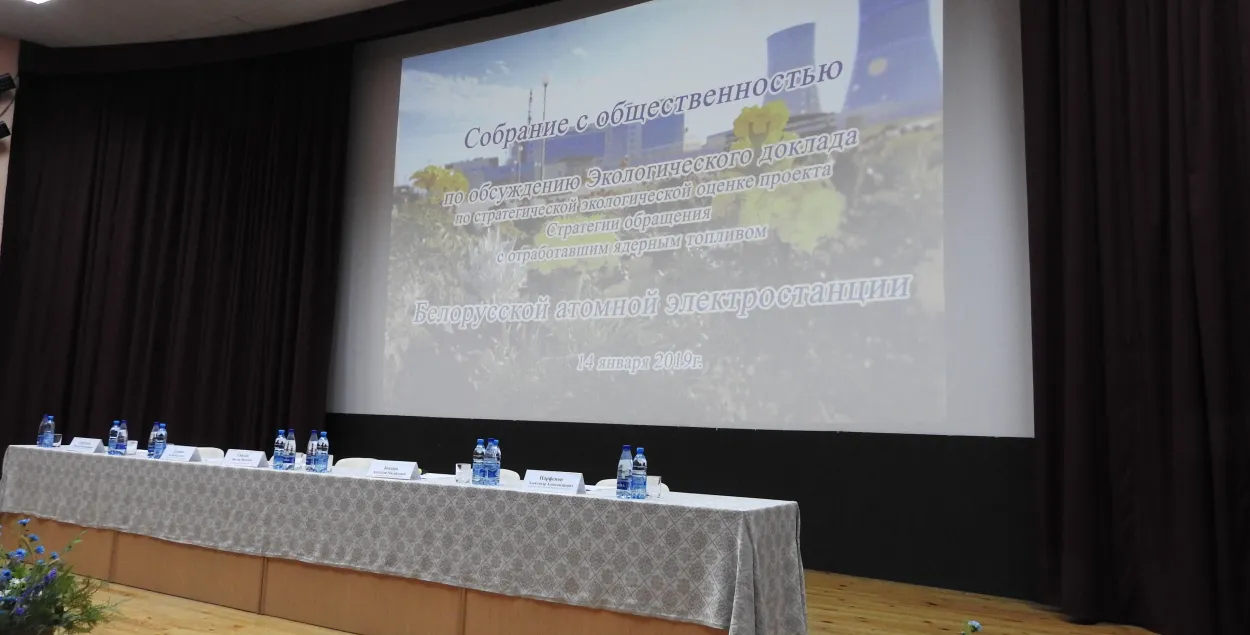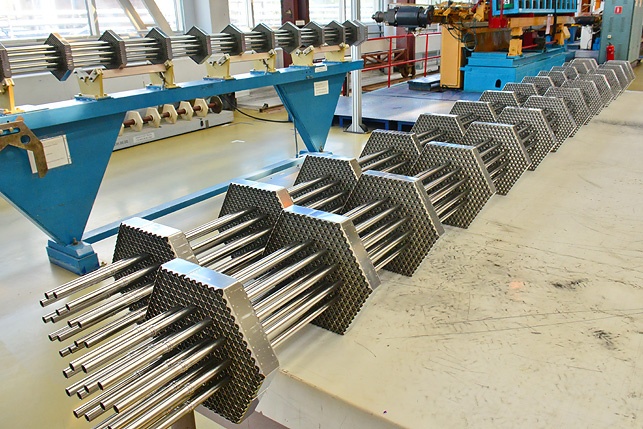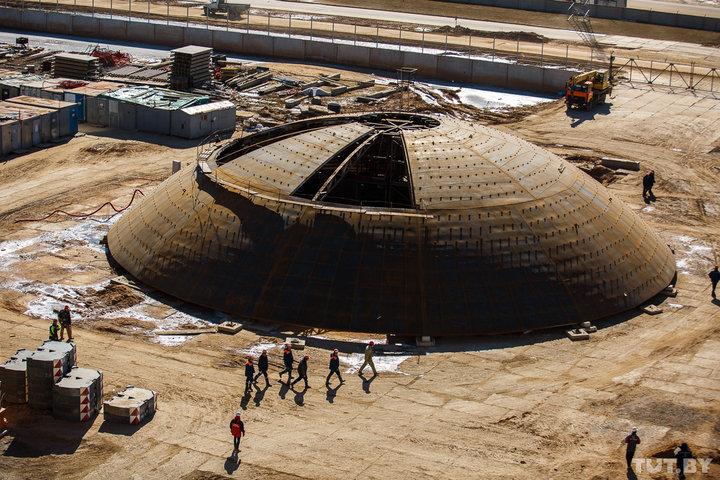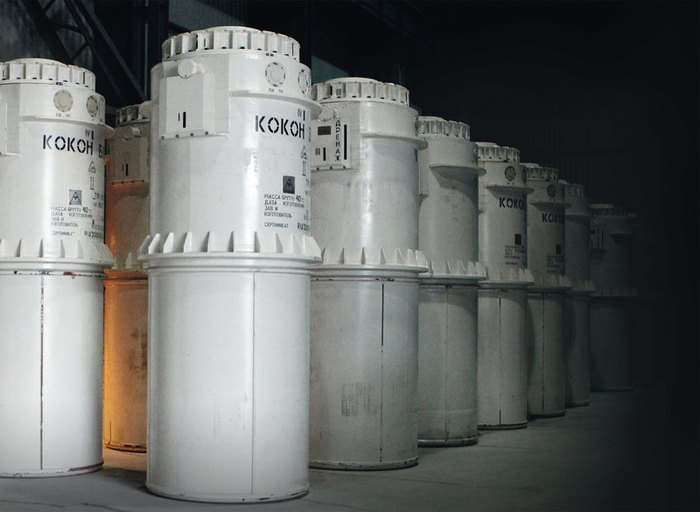The most expensive option. What's wrong about recycling nuclear waste in Russia?

Euroradio
The Belarusian NPP is to become profitable in the summer of 2019, but Belarus has not yet decided what to do with its spent nuclear fuel (SNF). There are three options: two of them provide for processing it in Russia, according to the third one, the waste will not leave the territory of Belarus. The third option is not seriously considered, while the first two have a lot of issues with them.
Nuclear waste will definitely be disposed of in Belarus, and what to do with it before it is buried was discussed at a public meeting in Astravets on January 14. Euroradio has listened to all the participants of the discussion and has come up with ideas about what is wrong with the Belarusian NPP waste recycling in Russia.
Used fuel will appear immediately after the launch of the Belarusian NPP
We will receive the first spent fuel four years after the launch. But, in essence, it begins to be considered "waste" exactly at the moment when the assembly is loaded into the reactor core:
"The second the assembly enters the core, it becomes spent nuclear fuel. The cassettes will work for four years in the core, then they will be placed in the holding pools at BelNPP. That is, four years after the start of the nuclear power plant, we will have the first spent fuel," the Deputy Chief Engineer of BelNPP Alyaksandr Parfyonau explained.
NPPs are scheduled to be launched already this year, which means we will receive the SNF very soon.
Belarus has three schemes for the treatment of spent nuclear fuel:
Option 1. To send the irradiated fuel assembly (SFA) of the Belarusian NPP for reprocessing to Russia, taking into account the long-term storage of spent nuclear fuel (SNF) in Russia, followed by the return of high-level waste (HLW) and their disposal in Belarus.
Option 2. To send the Belarus NPP SFA for reprocessing to Russia, taking into account the long-term "dry" storage of spent nuclear fuel in Belarus and the subsequent return and disposal of HLW in Belarus.
Option 3. Long-term storage of SFAs, including their subsequent burial, in Belarus (without sending it to Russia).
There is no comprehensive contract for reprocessing spent nuclear fuel in Russia

The agreement of 2011 “On Cooperation in the Construction of a Nuclear Power Plant in Belarus” states that waste from the Belarusian NPP is to be returned to Russia for processing, however conditions must be determined by a separate agreement.
Long-term storage of SNF in Belarus without reprocessing is contrary to this agreement. But the Belarus-Russia agreement on the reprocessing of spent nuclear fuel has not yet been signed, the conditions have not been defined. The Belarusian side has not prpovided information on when this will happen.
And if such an agreement is not signed? What will Belarus do with spent nuclear fuel? This issue was not considered in the environmental report, and representatives of the NPP and the Ministry of Energy could not reply to it in Astravets. It is not known how much processing and transportation will cost.
There is no exact information about the cost of processing and transporting SNF to Russia, as well as the cost of storing radioactive waste in Belarus:
“All commercial questions are a commercial secret. And you should understand this and not provoke us to answer,” urged the chief engineer of the Belarusian nuclear power plant Anatol Bondar. “The presentation did not specifically indicate the cost in rubles or other currency, but used a conventional comparative scale. All such calculations were carried out, but these figures cannot be disclosed. "
Why is the third option not considered?

The draft strategy for the management of spent nuclear fuel stipulates that in any case the nuclear waste will be buried in Belarus. This is required by international laws: the country that produces the waste must take full responsibility for it. Belarus will not be able to get rid of waste.
Alyaksandr Parfyonau said that the first option is considered a priority, the one involving transportation to Russia:
“Reprocessing will reduce the activity of nuclear waste. In Russia, during the reprocessing of SNF, cesium-strontium fractions will be obtained, which will then be returned to Belarus in a glassy state. Besides Russia, they are recycled in three more countries: Great Britain, Japan and France. But since the fuel will be of the Russian ”design", it will be recycled in Russia. The second option is very close to the first one in kind, but it differs in the length of waste storage in Belarus before it is sent to Russia for recycling. ”
The third option (without it being sent to Russia for processing) is proposed only because the law requires alternative options. And it is the least environmentally friendly of all three. It was considered in case Russia could not accept spent Belarusian fuel for reprocessing for economic or political reasons.
Is the recycling option only convenient for Russia?
Environmentalists and representatives of the Green Party believe that the option of processing fuel in Russia is unsuitable for Belarus:
“There are no completely safe and economically efficient ways of handling spent nuclear fuel in the world. But the reprocessing option is one of the most economically inefficient and unsafe ones,” said the Chair of the Belarusian Green Party Anastasiya Darafeyeva.
"This option is not suitable for countries where there is no military industry. Economically, it is more costly and more environmentally risky. After all, it will need to be transported to the processing site and back, prepared for transportation and storage of SNF somewhere before shipment. All these are additional risks that require additional security measures. And, accordingly, additional financial costs," she explains. “Many countries avoid processing and choose a deferred scenario, which means storage on their territory without dumping in the hope that “In the future, safe solutions for the reprocessing of SNF will be found. We believe that, if not the “zero” scenario, then at least this option should have been included for more detailed consideration and given more attention to, since it is one of the safest.”
The report presented in Astravets states that lately in Russia has not been a single serious nuclear or radiation incident during the transport of radioactive materials. However, this is not true. According to the report of the Deputy Director of the Emergency Technical Center of the Ministry of Atomic Energy of Russia Vladimir Yershov, 33 incidents were recorded in 2015 during the transportation of radioactive substances.
The so-called "zero option" -- to not launch the nuclear power plant -- was excluded from the report and was not discussed.
The burial ground will cost about 1 billion euros

Belenergo believe that the repository of radiation waste of the Belarusian NPP will be safe for the environment. The report refers to some three prospective locations within a radius of five kilometers from the nuclear power plant, but the exact location is not known.
Finally, the site is to be chosen before the end of 2021, it will be constructed taking into account all the norms of international and Belarusian laws, and the place for the burial ground will be discussed with the public. Until the storage facility is put into operation, spent nuclear fuel will be left at the station for ten years.
The operating life of the Belarusian NPP is 60 years. During this time, according to the “Strategy of Radioactive Waste Management of the Belarusian NPP” approved by the Council of Ministers of Belarus, about ten thousand cubic meters of radioactive waste of various categories will be obtained. According to experts, the cost of the burial ground is about 1 billion euros.


















